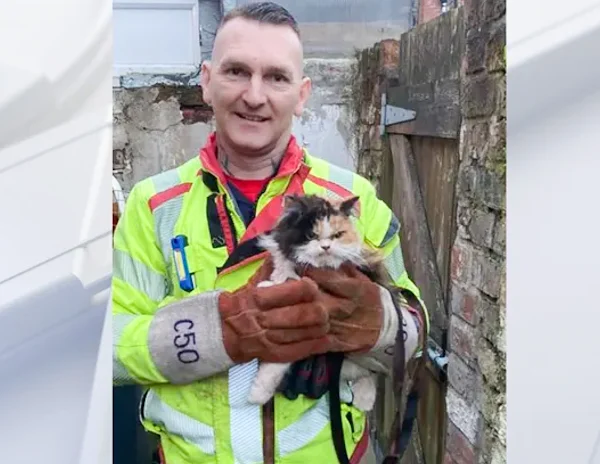There is a story on the Fox 13 Tampa Bay website which tells of a grumpy cat showing no gratitude after being rescued from between two walls. The cat had to be chiselled out of their predicament. It happened in Preston, Lancashire, UK. You can see the rescuer and the cat below.
Note about the picture: It is noticeable that the cat is a calico - a tortoiseshell-and-white. Torties have 'catitude' - meaning attitude. This may partially explain why she is described as not being grateful! 💕😉
So the question is why don't cats that have been rescued, sometimes after great effort, so any gratitude to the rescuers who often save their lives.
 |
| Grumpy female cat does not show gratitude for being rescued from being stuck between walls. |
Initial point
The initial point to make is that sometimes domestic cats will show their version of gratitude under certain circumstances. They may show subtle signs of it. I can remember a firefighter rescuing a cat from a destroyed building and the cat climbing onto the firefighter. She had a fearful look on her face. But her general demeanour and her behaviour indicated gratitude to me. Therefore, I don't think that we can generalise about domestic cats by saying that under all circumstances domestic cats don't show gratitude. They do sometimes but perhaps a different way to the way humans show it.
Concept of gratitude
I will try and answer that question. The first point to bring up is the concept of "gratitude". As humans know, gratitude means being thankful to others for the help that they have received. Or a gift that they have received. Or they might show gratitude for something good that has happened to them. Or, if a person has been rescued by somebody else. They will thank that person in an act of gratitude.
Human social norms
Why do we do it? Because it's part of good social etiquette. It is part of social norms. These of course are human norms within our human society.
Cats are solitary
To the first point is that cats don't have a society like humans in which they network and interact and help each other.
Cats - by which I mean domestic cats - are essentially solitary creatures because they have inherited their wild cat ancestor's character which is that of a solitary creature.
Multi-cat homes
Of course, domestic cats sometimes live multi-cat homes where they have to be somewhat sociable and get along with other cat. This is an adaptation to living in the human environment in a multi-cat home but cats under these circumstances can be stressed. They are more likely to be stressed than a solitary cat living with their caregiver is unnatural but they adapt as mentioned.
No society
So the point here is that domestic cats don't have a society and they don't have a hierarchy. And therefore they don't have societal norms. And therefore there is no need to be grateful for being rescued.
 |
| Domestic cat looking supremely content and grateful for all their caregiver brings them in their lives. |
Emotions
There are other issues. An act of gratitude stems from an emotion of thankfulness. And relief. It is doubtful that cats feel these emotions. Domestic cats feel certain emotions such as contentment and fear, anger and friendliness. But it is doubtful that they sense the higher emotions although this is work in progress.
So the emotional background is another point worth mentioning which might be a barrier to being grateful.
Rescuers are often strangers
A third point comes to mind. When a cat such as the one you see in the picture has been rescued from a very difficult and terrifying circumstance they may suddenly meet a complete stranger under very stressful circumstances. Domestic cats are often fearful of strangers. The emotion of fear will certainly block any requirement to feel grateful or to express gratitude.
Not in their armoury of behaviours
The bottom line probably is that domestic gas don't have the social behaviour of expressing gratitude in their armoury of behaviours. It simply does not exist and the reasons above, I hope, help to provide some understanding of this characteristic.
Caveat/exceptions?
There is some caveats. It undermines what I've just said in the last paragraph. If a cat is left alone in your home most of the day and perhaps feels the emotion of separation anxiety, they will be grateful to see you when you come back from work. They will rub against your leg and perhaps purr. They might express their gratitude toward you for returning to them.
And if a cat has a favourite treat and you provide them with this treat, before you provide it they might express their gratitude in anticipation of receiving it by rubbing up against you and going up on their hind legs to head-butt you.
I think therefore that sometimes domestic cat can demonstrate their version of gratitude but it is a bit different to our version.
Wild cats
I have seen conservationists in videos releasing small wild cat species from cages after they have been rescued and rehabilitated. And we the cat running away as fast as possible into the undergrowth. No gratitude whatsoever. This reinforces the argument that cats don't show gratitude. But then, once again, we have to understand the circumstances under which they have been placed which would have been highly stressful for the reasons mentioned above. And they are suddenly surrounded by people. Wild animals are fearful of people in general. People are the world's top predator.
In Africa when they played the sound of human voices as a waterhole through loudspeakers, all the animals were scared. Even a leopard dropped its prey and ran off. They were more scared of the human voice than prey animals are scared of lions!
--------------



ليست هناك تعليقات:
إرسال تعليق
Your comments are always welcome.
ملحوظة: يمكن لأعضاء المدونة فقط إرسال تعليق.